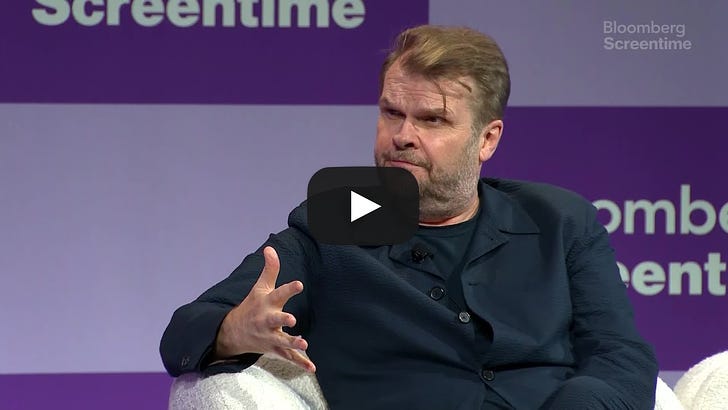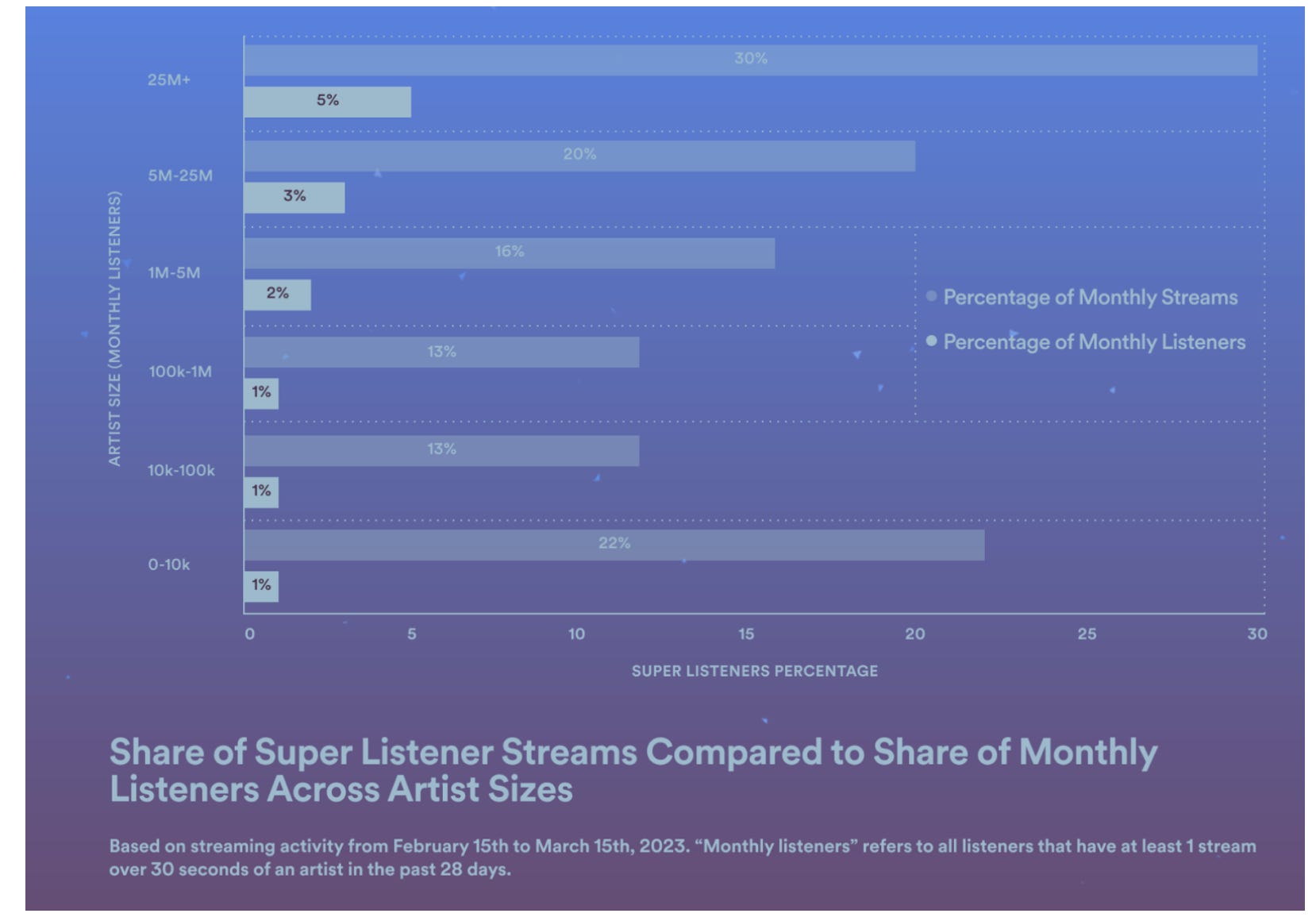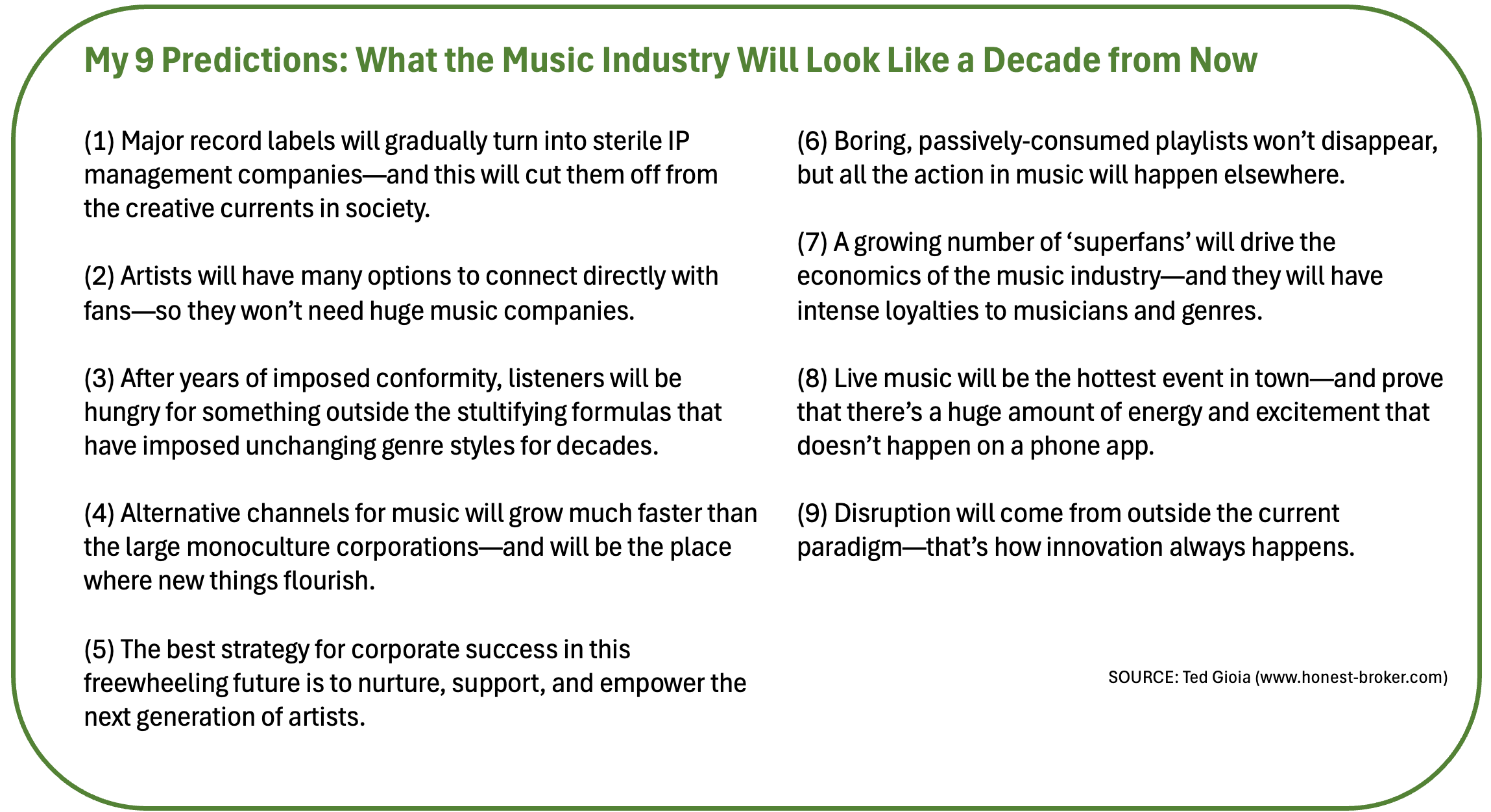Nine Predictions for the Future of the Music BusinessI offer a forecast for 10 years in the future—and it's filled with good news (surprise!)I’d go broke as a fortune teller. Visitors to the palm-reading store want upbeat predictions—hot dates, happy weddings, unexpected inheritances from D.B. Cooper, and such like. But my predictions are more like the weather forecast for East Antarctica. In my world, there’s always a cold front coming in. That’s me. I’m Gloomy Gus, and my glass is always less than half full. If you want to support my work, consider taking out a premium subscription (just $6 per month).Ah, I’m going to surprise you today. I see a happier future for our music culture. The new golden age might not arrive tomorrow or next month, or even next year. But if I take a long enough time horizon, the trends are encouraging. It’s hard to kill music. Powerful people are trying very hard to do that. They want to turn music into generic content, removing those pesky artists, and replacing them with bots and algorithms—with all profits sucked into the greedy maws of the data lords. But the people doing this will just destroy themselves, if you give them enough time. You can’t cut the cojones off music, and get away with it. It inevitably forces a backlash. Maybe passive sheeple will consume generic music, produced and processed by humongous Nvidia server farms. But a resistance movement will arise, led by smart, independent folks who will set the tone for the culture. People don’t just resist. They mock the ruling powers, and establish their alternative channels—just like the counterculture of an earlier day. Movements of this sort often anticipate and influence mainstream culture. And these rebels have the greatest impact during eras of deadening conformity imposed by the ruling powers. Sorta like what’s happening now. So a backlash is inevitable. Let me spell it out, step by step…. My Nine Predictions: What the Music Industry Will Look Like in 10 Years(1) Major record labels will gradually turn into sterile IP management companies—it’s already happening—and this will cut them off from the creative currents in society.Record labels and streaming platforms are now run by lawyers, accountants, and technologists—and they are laughably out-of-touch with the world of artistry and creativity. Even worse, they have lost faith in the redemptive power of music. This is their single biggest weakness. The music business has always suffered from excessive greed and hubris, but the bosses at the record labels at least understood that music was magical stuff. It’s life changing—actual lightning in a bottle. But the current leaders hate that idea.Instead they are now pushing a business model based on passive listening by an indifferent audience. The only songs they trust are tired and hoary hits from the past. That’s why major labels invest so much cash in acquiring old song catalogs—instead of launching new artists. Maybe they can squeeze some profits from these moldy oldies for a few years, but this fundamentally changes the nature of their business. They’re looking backward, not forward. At best, they are portfolio managers, not stewards of a creative enterprise. If something fresh and exciting happens on the music scene, they will probably fight against it. Instead of promoting something disruptive and rebellious, they will back some boring AI imitation of yesterday’s trend. Sure, they will eventually figure out what’s happening. But it will be too late. That’s because… (2) Artists will have many options to connect directly with fans—so they won’t need huge music companies.Did you see how fast TikTok took off? Record labels didn’t know what hit them. And the same thing happened previously with YouTube, Napster, MySpace, Limewire, and other platforms. Many of these eventually collapsed—and for a good reason. Real empire-building in music requires artistry and creativity, not just digital distribution. There are simply too many ways music can reach its audience in the current day—and more are coming in the future. Almost every week, I hear from another music startup that wants to help musicians bypass the system. Most of them will fail, but some will survive, and a few will enjoy enormous success. I’m a writer who bypassed the legacy publishing industry via Substack and took control of my own career. The same thing will happen in music. It has already started. It’s still early days for direct distribution of music, but if you look out 10-15 years, the cumulative change will be enormous. The big players (Spotify, Universal Music Group, etc.) will make this easier, because they are getting worse and worse over time. (Spotify’s user interface still suffers from most of the problems I identified more than a decade ago.) That’s why it was so easy for TikTok to clean their clocks—and other new entrants will do the same. Musicians will have many options, and digital distributors will be forced to compete for talent—or fall by the wayside. (3) After years of imposed conformity, listeners will be hungry for something outside the stultifying formulas that have imposed unchanging genre styles for decades.The major music genres haven’t really changed in this century. I have acute ears, but it’s almost impossible to listen to a country, jazz, pop, rock, or hip-hop song and tell whether it came out this week or a quarter of a century ago. The corporatization of music has imposed this conformity on listeners. The pervasive algorithms and metrics are a big part of this stagnancy—they are always backward-looking, analyzing the past before making any decision. The worst culprits are the large entertainment businesses. They have grown cautious and formula-driven in recent years (just look at Hollywood or video games or TV, where reboots are everywhere). We already see audiences lose interest in these formulas. They want something new. Sooner or later, they will demand something new. And f the big companies don’t provide it, they will find another source. This, too, is already underway. Here, again, we are in the early innings, but I can safely predict that… (4) Alternative channels for music will grow much faster than the large monoculture corporations—and will be the place where new things flourish.The rise of alt platforms is taking place in every creative field, and not just music. Dominant legacy players are struggling—many are even shrinking or shutting down. But the alternative channels keep growing, year after year. This will be the biggest shift of the century in the culture business. And nothing can reverse this trend.
The dominant will drop like dominoes. The larger they are, the less prepared they are to operate in the fast-moving currents of tomorrow. If they want to flourish over the long term, they need to embrace a new rule, namely… (5) The best strategy for corporate success in this freewheeling future is to nurture, support, and empower the next generation of artists.In a fast-moving, decentralized world, you win by being fast and flexible. The large companies haven’t figured this out yet—so they are playing losing cards in this new game. That’s why record labels are now offering very flexible terms to TikTok stars. I hear that royalty rates of 50% are now possible, and even future ownership of the master recordings. Labels aren’t doing this because they suddenly decided to be generous. They are sweetening deals because they have nothing else to offer. They are trying to sign artists who absolutely don’t need a record label—because they have already gone viral and are making money as indie operators. Unless the major music companies get smart in a hurry, they will find themselves shut out of the game. Owning a bunch of fifty-year-old songs won’t even begin to solve their problems. (6) Boring, passively-consumed music won’t disappear, but all the excitement will be elsewhere.Spotify will continue to churn out formula-driven playlists, padded with generic AI content. If you’re looking for “Ambient Music for Sleeping” or “Electronica for Reading” or other aural ooze, they will be your go-to source. And the private equity firms and major labels who bought the rights to old songs will continue to push them everywhere. You will hear dead rock stars on TV commercials for detergent and toothpaste. Yawn. The algorithmic sludge will flow 24/7, but this won’t be the source of energy and excitement in our music culture. The more the bosses try to turn everything into a formula, the more they ensure their own irrelevance. Instead… (7) A growing number of ‘superfans’ will drive the economics of the music industry—and they will have intense loyalties to musicians and genres.The streamers will be proven wrong. They envision a future of passive listeners consuming bland AI tracks, intermixed with advertisements. But we already see the rise of a different kind of music lover—known as the superfan. Superfans already generate 30% of the streams for major artists, and they buy half the merchandise. This audience will set the tone for the future. Streamers hate them—because superfans are less profitable online than those brain-numbed consumers on autoplay that tech companies manipulate at will. They pay the same subscription fee as everybody else, but listen to lots more music According to Silicon Valley math, these are the worst customers. They love music too much. But for the musician, a superfan is ten—or twenty—times more valuable than a passive listener. So this is where the rupture between the tech business and the music business will happen. The superfan category is growing fast, and these loyal listeners will ensure a more exciting future for music. In particular, they will cause the next significant trend…. (8) Live music will be the hottest event in town—and prove that there’s a huge amount of energy and excitement that doesn’t happen on a phone app.Superfans want live music, and are willing to pay for it. We’re seeing that right now with Taylor Swift’s Eras Tour. Who would have guessed that the biggest income stream in music would come from bypassing the streaming/digital world. But that’s exactly what’s taking place. This isn’t a fluke. Despite all the hype about AI and digital, the biggest money-makers in music come from real experiences. Just last week, the head of Sony Music Group admitted that live shows are now much bigger profit generators than streaming for them—he explains that the touring show MJ: The Musical is a “gold mine.” Then he adds: “That’s a revenue stream that is, quite frankly, more lucrative than streaming.”  This is a shock to many industry insiders. They are so obsessed with clicks and apps, they are missing the biggest opportunities—which involve direct contact between musicians and their fans. That’s our future. And it will be both profitable for performers and healthy for the culture. (9) Disruption will come from outside the current paradigm—that’s how innovation happens.Hot new things in music have always come from outsiders. It will happen that way in the future, just as it has always happened in the past. So look to the fringes and the margins of society. Look to the live music scene, the dance clubs and underground venues. Look to the alternative digital platforms. Look outside the US, and especially to countries previously excluded from the Billboard charts. Look to the young and restless. Look to the rebels. They will set the tone. Not some streaming platform CEO in Sweden or private equity firm in New York or tech beancounter in Cupertino. Those gatekeepers have a little time left to collect their gate fees. But not as much as they think. I hold no resentment against them. But we will all be better off when the next wave comes, and knocks them off their throne. That’s what I see 10 years from now. And it might not take anywhere near that long. You're currently a free subscriber to The Honest Broker. For the full experience, upgrade your subscription. |
Search thousands of free JavaScript snippets that you can quickly copy and paste into your web pages. Get free JavaScript tutorials, references, code, menus, calendars, popup windows, games, and much more.
Nine Predictions for the Future of the Music Business
Subscribe to:
Post Comments (Atom)
When Bad People Make Good Art
I offer six guidelines on cancel culture ͏ ͏ ͏ ͏ ͏ ͏ ͏ ͏ ͏ ͏ ͏ ͏ ͏ ͏ ͏...
-
code.gs // 1. Enter sheet name where data is to be written below var SHEET_NAME = "Sheet1" ; // 2. Run > setup // // 3....




No comments:
Post a Comment